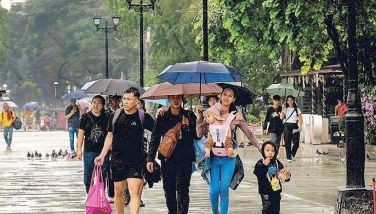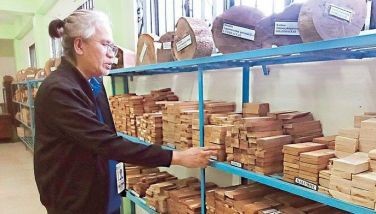Unicef, Red Cross appeal for RP victims
December 5, 2004 | 12:00am
GENEVA (AFP) — The Red Cross federation and the UN Children’s Fund (Unicef) on Friday appealed for more than two million dollars to help hundreds of thousands of people hit by deadly storms in the Philippines.
A team of UN disaster relief experts was also due to arrive in Manila on Saturday to help deal with the devastation from two storms in four days that have battered the northern part of the country leaving 1,100 dead and missing.
The International Federation of Red Cross and Red Crescent Societies said that the money would be used for emergency relief and also help fight disease amid fears of epidemics ravaging the already battered area, while warning that more funds would be needed in the wake of the latest typhoon.
The Red Cross appealed for an initial $1.7 million, while Unicef asked international donors for $720,000.
"The rescue and relief operation, already hampered by difficult access and destroyed infrastructure, is being threatened by the arrival of Yoyong, the most powerful typhoon to hit the Philippines this year," the federation said.
"A full emergency appeal will be launched once the impact of Yoyong has been evaluated, and the needs of the affected population established," it said.
More than 800,000 people have been affected by the raging storms, the Red Cross said, citing official figures.
Many communities around the coastal towns of Real, Infanta and General Nakar in Quezon — which bore the brunt of the tempest — have been submerged by floodwaters and landslides and are only accessible by helicopter.
"Our support to the Philippine National Red Cross will initially focus on the provision of emergency food items, basic household supplies, including cooking equipment, mosquito nets and blankets," said Bekele Geleta, head of the Federation’s regional delegation for South-East Asia.
The Red Cross will also provide construction materials to rebuild homes, basic health and hygiene kits, water purification tablets and mobile health services to provide basic health care.
"With water-borne diseases a real concern, the Federation will also support PNRC volunteers in conducting health education and disease surveillance in affected communities," Geleta said in the statement.
Adding its weight to the relief effort, Unicef said it was already providing 100,000 dollars worth of emergency supplies to the provinces of Aurora and Camarines Norte, which have been hit in close succession by typhoon "Violeta," tropical depression "Winnie" and super-typhoon "Yoyong."
"Unfortunately, most transportation and communication facilities are down and exact data on the situation of children in these areas are not yet available," the agency said in a statement.
Despite fears of disease spreading, especially with the mounting pile of corpses, the World Health Organisation (WHO) said it was not crucial to bury the dead immediately for health reasons.
"There is a misconception that dead bodies add a burden on health risks, it is not true," said a WHO spokesman.
"There is no need for any special precautions, no need for mass graves," he told a regular news conference in Geneva.
For its part, WHO has pumped $20,000 worth of support into the relief effort in the Philippines to support the assessment of urgent health needs.
In addition, the UN Office for Coordination of Humanitraian Affairs said that it had dispatched a Disaster Assessment and Coordination Team (UNDAC) to the flood stricken country.
"The five-member UNDAC team will be despatched and expected to reach Manila tomorrow afternoon," it said in a brief statement.
A team of UN disaster relief experts was also due to arrive in Manila on Saturday to help deal with the devastation from two storms in four days that have battered the northern part of the country leaving 1,100 dead and missing.
The International Federation of Red Cross and Red Crescent Societies said that the money would be used for emergency relief and also help fight disease amid fears of epidemics ravaging the already battered area, while warning that more funds would be needed in the wake of the latest typhoon.
The Red Cross appealed for an initial $1.7 million, while Unicef asked international donors for $720,000.
"The rescue and relief operation, already hampered by difficult access and destroyed infrastructure, is being threatened by the arrival of Yoyong, the most powerful typhoon to hit the Philippines this year," the federation said.
"A full emergency appeal will be launched once the impact of Yoyong has been evaluated, and the needs of the affected population established," it said.
More than 800,000 people have been affected by the raging storms, the Red Cross said, citing official figures.
Many communities around the coastal towns of Real, Infanta and General Nakar in Quezon — which bore the brunt of the tempest — have been submerged by floodwaters and landslides and are only accessible by helicopter.
"Our support to the Philippine National Red Cross will initially focus on the provision of emergency food items, basic household supplies, including cooking equipment, mosquito nets and blankets," said Bekele Geleta, head of the Federation’s regional delegation for South-East Asia.
The Red Cross will also provide construction materials to rebuild homes, basic health and hygiene kits, water purification tablets and mobile health services to provide basic health care.
"With water-borne diseases a real concern, the Federation will also support PNRC volunteers in conducting health education and disease surveillance in affected communities," Geleta said in the statement.
Adding its weight to the relief effort, Unicef said it was already providing 100,000 dollars worth of emergency supplies to the provinces of Aurora and Camarines Norte, which have been hit in close succession by typhoon "Violeta," tropical depression "Winnie" and super-typhoon "Yoyong."
"Unfortunately, most transportation and communication facilities are down and exact data on the situation of children in these areas are not yet available," the agency said in a statement.
Despite fears of disease spreading, especially with the mounting pile of corpses, the World Health Organisation (WHO) said it was not crucial to bury the dead immediately for health reasons.
"There is a misconception that dead bodies add a burden on health risks, it is not true," said a WHO spokesman.
"There is no need for any special precautions, no need for mass graves," he told a regular news conference in Geneva.
For its part, WHO has pumped $20,000 worth of support into the relief effort in the Philippines to support the assessment of urgent health needs.
In addition, the UN Office for Coordination of Humanitraian Affairs said that it had dispatched a Disaster Assessment and Coordination Team (UNDAC) to the flood stricken country.
"The five-member UNDAC team will be despatched and expected to reach Manila tomorrow afternoon," it said in a brief statement.
BrandSpace Articles
<
>
- Latest
- Trending
Trending
Latest
Trending
Latest
Recommended






























